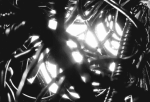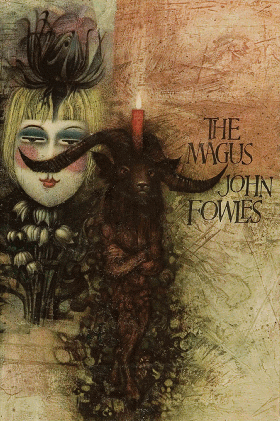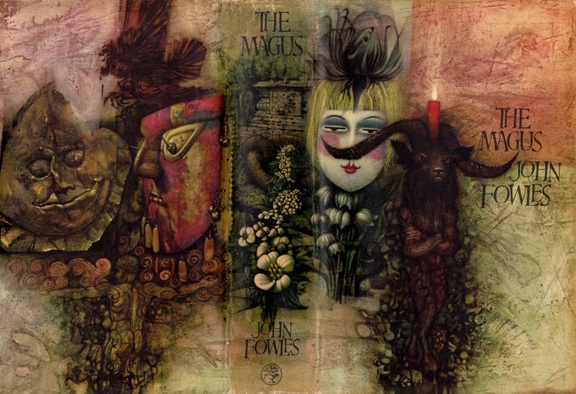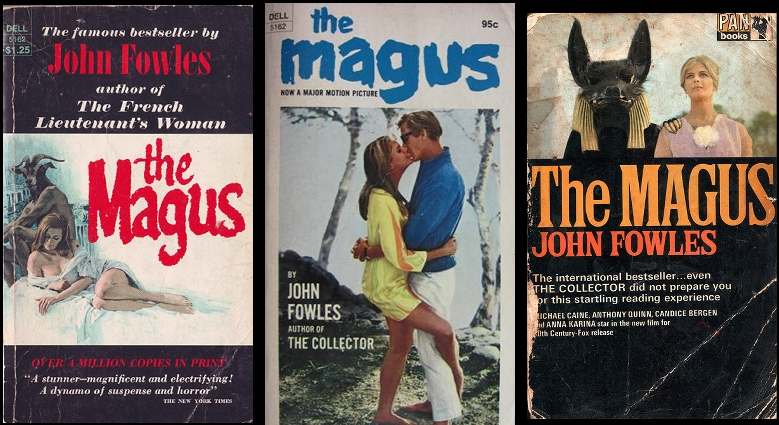After I finished reading “The Magus” by John Fowles, and while in the process of wrapping up my review of it, I found out two things that I knew would eventually lead to this follow-up. The first is that I compared a few key passages of the book, between the original version and the revision, and I decided that not only the revision is much worse, but that Fowles must have HATED the book, somehow, as if belonging to a young self he now despised and and decided to reject, to the point of defacing it through the revision.
I have the feel that “whoever” wrote The Magus wrote it in a moment of inspiration and enlightenment. My thought is that the older Fowles lost some of that clarity and so, in reading again his own book, found himself as separate from it. Like a foreigner. All the changes I found in the parts I compared are for the worse, and in some cases so bad that they utterly destroy the strong points of the book.
But on the positive side I also found out that Fowles, two years before the publication of The Magus, published another really interesting book titled “The Aristos: A Self-Portrait in Ideas”, and this is particularly important to put in the light of The Magus since the two books are directly connected. The Aristos is like the last episode of Evangelion, it reveals the very naked structure of The Magus, stripping away from it characters and story. This happens SO RARELY and, because so, it’s like finding a diamond. Writers never fully reveal their tricks, they never remove the curtain. You are not allowed to see how they work, how the creation comes alive. And for the kind of reader I am, this is the hidden aspect my attention is actually always on, the rest being a distraction. So I’m always excited when the CIPHER to a book is offered so plainly, and generously I guess.
The Aristos is like finding The Magus’ spellbook. And feeling like you’re reading a forbidden text that should have been kept secret. Something only for initiates.
In my review of The Magus you could see that one of the quotes doesn’t come from the book, because it comes from The Aristos, just a little trick on my part. The book is actually not that easy to find nowadays, but I have a copy. Horribly, the preface reveals it’s a goddamned revision. AGAIN. Fowles decided to rewrite this too. The big problem is that I searched all over the internet, but couldn’t find the original version. On the other hand the revision is only two years older than The Magus itself, so there’s always hope Fowles did not yet lost that clarity I’m after. Though his own words in the preface sound ominous:
This edition contains new material, but it is shorter than its predecessor and, I sincerely hope, much clearer. One other criticism of the first edition I fully deserve. There was an irritating swarm of new-coined words. These I have almost completely abolished.
I WANT THE IRRITATING SWARM OF NEW-COINED WORDS. Damn you, Fowles, I’m after your enlightened self that you lost on the way! So here I am with a book I have now the feel has been emptied of its full power and inspiration… I’m convinced that the unrevised version would be so much more important for me, but I’ll have to do with what I have.
Regardless of “what it might have been”, the book is indeed amazing. The Aristos is basically a philosophical book that lays out plainly Fowles’ mythology. Literally a godsend:
The book you are about to begin is written in the form of notes. This is not laziness on my part, but an attempt to suppress all rhetoric, all persuasion through style.
And the actual beginning is one of the Best Ever:
1. Where are we? What is this situation? Has it a master?
It proceeds from there, with very simple inferences. In some ways it reminds me, more than Wittgenstein (to which this is often compared), of geometry. Setting a few basic rules and then use them to build a system.
The trick is to at least remove the illusion of ambiguity.
Still in the introduction, there’s this passage:
I believe this is one of the great heresies – and tyrannies – of our time. I reject totally the view that in manners of general concern (such as the meaning of life, the nature of the good society, the limitations of the human condition) only the specialist has the right to have opinions – and then only in his own subject. Trespassers will be prosecuted.
In my opinion, this reads like a declaration of Post-modernism. To cross barriers and contaminate. To shift the focus. Only this way, for example, you begin to see that some mythology patterns have common roots in different religions. Not simply because of cultural relations, but also because they still originate from the human condition, and so they also all lead back there.
So even in reading The Aristos I go through Fowles’ philosophical points and trying to validate them using my system of reference. In the end the pieces of the puzzle (of the human condition and Reality) are not endlessly wiped and rewritten as it may seem, but they are repositioned on the bigger blackboard.
3. All that exists has, by existing and not by not being the only thing that exists, individuality.
5. The forms of matter are finite, but matter is infinite.
This is again similar to the foundation of the last episode of Evangelion, but also the root of the Law of Form of Spencer-Brown that I often quote. More importantly, the common “pattern” Fowles describes is coherent with the true nature of man. The starting point: the Big Bang that is the origin of the human condition, and that so precedes the Big Bang of physical reality (since we assume the world preceded the human life, but here there’s an obvious contradiction to what I just said that was deliberate, let it not distract you).
A bit like the basic “I think, therefore I am”, often used as a starting point for philosophy for kids because it’s intuitive. Individuality on its own doesn’t exist. It exists when it is observed, and so it requires self-observation. Meaning: only an individuality can recognize itself.
This is intuitive because “we are”, and “we feel”. It’s a basic point because individuality as an abstract concept starts as our own individuality. The fact we are alive. The fact we fear death. The fact we have a beginning an an end, that separates us from everything else (and so creates our individuality).
So we perceive ourselves because we observe a basic distinction between us and the rest, a dividing line. That dividing line is the human condition, or its Big Bang.
Yet we must know that while our individuality is finite, the world and Reality are whole and infinite (as Fowles says at point 5). And we mis-perceive the world and ourselves because we are part of that continuous, infinite thing. We perceive individuality, but we are a continuity.
(form The Magus)
I had the sense this was the fundamental reality and that reality had a universal mouth to tell me so; no sense of divinity, of communion, of the brotherhood of man, of anything I expected before I became suggestible. No pantheism, no humanism. But something much wider, cooler and more abstruse. That reality was endless inter-action. No good, no evil; no beauty, no ugliness. No sympathy, no antipathy. But simply interaction. The endless solitude of the one, its total enislement from all else, seemed the same thing as the total inter-relationship of the all. All opposites seemed one, because each was indispensable to each. The indifference and the indispensability of all seemed one. I suddenly knew, but in a new hitherto unexperienced sense of knowing, that all else exists.
There was no meaning, only being.
Fowles proceeds explaining that the upper world follow rules that are indifferent to the individual. And Good and Bad, Pleasure and Pain, exist because our individuality creates them. We become the measure and balance of what otherwise is neutral and unconcerned. In the relation to us things become good or bad, pains or pleasures.
The Kabbalah’s spiritual “physics” (and Evangelion in its own way) says men come to be from God’s light as separate entities because they were divided by a barrier called “egoism”. It’s the exact same idea. We are driven by desire, because it is created by individuality. Egoism is self. If you want to see this in a more creative literary form you can try read some David Foster Wallace’s short stories titled “The Devil is a Busy Man”, on the technical impossibility of true altruism. In Kabbalah’s physics the egoism is literally the human condition, you can’t avoid it because doing so would undo you as a “man”. So the truth of the condition isn’t obscured as a mere attempt to persuade people to well behave.
17. Man is an everlack, an infinite withoutness, afloat on an apparently endless ocean of apparently indifference to individual things.
14. Man is a seeker of the agent. We seek an agent for this being in a blind wind, this being on a raft; the mysterious power, the causator, the god, the face behind the mysterious mask of being and not being.
I inverted here Fowles’ order because the second is consequence of the first. You can find a positive or negative cause. The positive, like in Kabbalah, says that even in happiness a man feels some lack, the need for a greater purpose that gives his life meaning, spirituality. Desire can never be fulfilled, or the fulfillment is always momentary. The negative cause instead comes from pain. Man wonder “why” all the pain, what it is all for. Something that may justify, and maybe excuse, it all.
33. We build towards nothing; we build.
34. Our universe is the best possible because it can contain no Promised Land; no point where we could have all we imagine. We are designed to want: with nothing to want, we are like windmills in a world without wind.
But again, the immediacy that we feel about these thoughts still origins from our nature as individual. An original separation that in religion is “from god”, or from Eden or whatever literal manifestation of the abstraction. But we know that even from a “scientific” or logical point of view that separation does exist, and it happens the moment we observe (and feel) individuality.
So Fowles’ image of a raft (individuality) in a blind wind and endless ocean (the continuity of the world) preserves the truth of the human condition. And so life as a “passage” from an Eden and toward some promised land. They are just separation from the world as it actually always is. The flux of a process.
Then he continues stating this is the best of possible worlds, or: The necessity of hazard.
24. I am is I was not, I might not have been, I may not be, I shall not be.
25. In order that we should have meaning, purpose and pleasure it has been, is, and always will be necessary that we live in a whole that is indifferent to every individual thing in it; and the precise form of its indifference is that the duration of being and the fortune during being of each individual thing are fundamentally but not unconditionally in hazard.
26. What we call suffering, death, disaster, misfortune, tragedy, we should call the price of freedom. The only alternative to this suffering freedom is an unsuffering unfreedom.
22. A god who revealed his will, who ‘heard’ us, who answered our prayers, who was propitiable, the kind of god simple people like to imagine would be desirable: such a god would destroy our hazard, all our purpose and all our happiness.
These few points unify two important concepts. One I was discussing here, quoting another passage from the Kabbalah (scroll to the second quote block), and about the necessity of partiality (individuality) and pain to be able to also partake with freedom. The other is about my discussion on free will. Or the problem of free will in a deterministic world.
The description I made is very similar to Fowles’ necessity of hazard and his hypothetical mythology that comes next, that I quoted partially in my The Magus review (go to see it). “If there had been a creator, his second act would have been to disappear.”
The same basic trick of the act of writing a story. The writer disappears, creates a fictional world, characters can only be believable as long they don’t know the world is fictional and act on their own will and individuality.
More importantly, this is abstraction and metaphysical and even religious SPECULATION (and the reason why no one is usually interested in this I’m writing), but the personal position of an actual scientist, guess what? It’s identical!
Here’s Sean Carroll, who I follow on internet because he’s one of the pioneers of modern science with also a role in helping the explanation of very complex new theories to the general public.
The search for certainty in empirical knowledge is a chimera. I could always be a brain in a vat, or teased by an evil demon, or simply an AI program running on somebody else’s computer — fed consistently misleading “sense data” that led me to incorrect conclusions about the true nature of reality. Or, to put a more modern spin on things, I could be a Boltzmann Brain — a thermal fluctuation, born spontaneously out of a thermal bath with convincing (but thoroughly incorrect) memories of the past. But — here is the punchline — it makes no sense to act as if any of those is the case.
Maybe you are a brain in a vat. What are you going to do about it? You could try to live your life in a state of rigorous epistemological skepticism, but I guarantee that you will fail. You have to believe something, and you have to act in some way, even if your belief is that we have no reliable empirical knowledge about the world and your action is to never climb out of bed. On the other hand, putting aside the various solipsistic scenarios and deciding to take the evidence of our senses (more or less) at face value does lead somewhere; we can make sense of the world, act within it and see it respond in accordance with our understanding.
Now compare that quote from Carroll to this back from Fowles:
36. We are in the best possible situation because everywhere, blow the surface, we do not know; we shall never know why; we shall never know tomorrow; we shall never know a god or if there is a god; we shall never even know ourselves. This mysterious wall round our world and our perception of it is not there to frustrate us but to train us back to the now, to life, to our time being.
74. I do not consider myself an atheist, yet this concept of ‘God’ and our necessary masterlessness obliges me to behave in all public matters as if I were.
The first part of point 36 reads like the title Carrol gave to his blog post: “What I Believe But Cannot Prove”.
(I consider this explanation as radically different compared to the famous Pascal’s Wager. As that’s more like a selfish, pragmatic bet that doesn’t actually help understanding; where understanding is the goal, opposed to just convenience. And for sure we cannot infer what is to gain or lose.)
We are, as human beings, in a transition, but this essence is ETERNAL. We do not have a place to reach. We will never have it. The origin and end, like birth and death, make the transition possible as a place, defining it, but then they stay outside experience. Our essence is about staying in this transition (process). And accept it for what it is.
42. Look out of the window: everything you see is frozen fire in transit between fire and fire. Cities, equations, lovers, landscapes: all are hurtling towards the hydrogen crucible.
The consequence of this, both for Carroll and Fowles, is that we are forced to use our free will, like I say in my post. We are forced to think as if we are atheists, in Fowles’ words, with our attention focused on our time being. The now. Our actual responsibility on this world, the effect our actions have on other people. Our own responsibility, our own free will, our own limited judgement, given that “we shall never know why; we shall never know tomorrow.” It’s entirely on us.
The driver of a lorry carrying high explosives drives more carefully than the driver of one loaded with bricks; and the driver of a high-explosive lorry who does not believe in a life after death drives more carefully than one who does. We are all in this nitroglycerine truck.
And the last point (of this section) Fowles writes is a thing of poetry and absolute beauty that almost unifies Lovecraft with the movie “2001: A Space Odissey”:
76. I live in hazard and infinity. The cosmos stretches around me, meadow on meadow of galaxies, reach on reach of dark space, steppes of stars, oceanic darkness and light. There is no amenable god in it, no particular concern or particular mercy. Yet everywhere I see a living balance, a rippling tension, an enormous yet mysterious simplicity, an endless breathing of light. And I comprehend that being is understanding that I must exist in hazard but that the whole is not in hazard.
Seeing and knowing this is being conscious; accepting it is being human.




